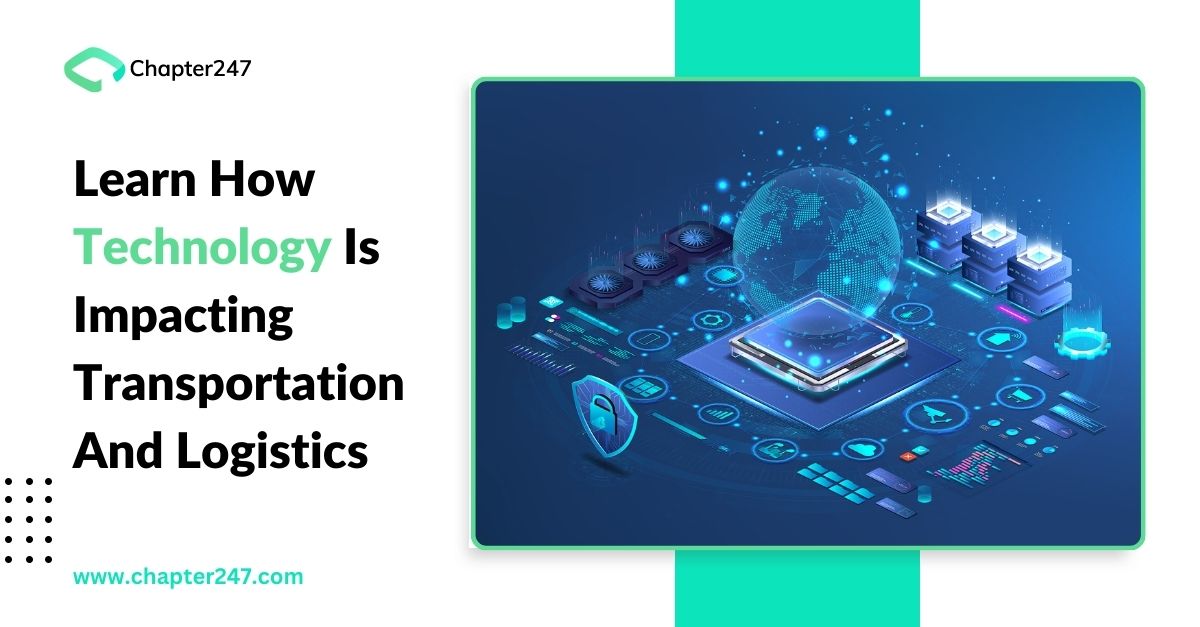Set out on a data-driven investigation of the ever-changing logistics and transportation scene. Discover the unnoticed effects of technology, as statistics show a sector that has been transformed by efficiency and innovation.
Table of Content
- Introduction
- Types Of Different Technologies That are Shaping The Industry
- Importance Of The Impact Of Technology On These Industries
- Conclusion
Within the ever-changing industrial landscape, technology is the primary driver of change. The significant impact that technological advancements have had on a variety of sectors is highlighted by recent statistics. Global information technology spending is expected to reach $4.2 trillion in 2022, according to a Statista report, demonstrating the critical role that technology plays in reshaping the business world.
We will examine the wide range of technologies that are currently influencing various industries in this investigation. Blockchain, the Internet of Things, and Artificial Intelligence (AI) are just a few of the innovations that are transforming business operations and offering previously unheard-of efficiency and transformative opportunities.
Types Of Different Technologies That are Shaping The Industry
Are you wondering what technologies those are impacting the most? Let’s have a look. Here we are including several technologies that are impacting the transportation and logistics industry.
i. Artificial intelligence (AI): At the forefront of technological advancement, AI has a profound effect on a wide range of industries. According to recent data, the global AI market is projected to grow to $190 billion by 2025.
Artificial Intelligence is improving healthcare diagnostics and treatment plans and improving manufacturing production processes. AI’s capacity for adaptive learning is transforming consumer interactions and generating individualised experiences in e-commerce and other domains.
ii. Internet of Things (IoT): By tying systems and devices together, the IoT ecosystem is ushering in a new era of connectivity. According to recent studies, by 2025, there will be more than 75 billion IoT-connected devices worldwide. IoT makes it possible to track shipments in real-time in logistics, which improves supply chain efficiency. The Internet of Things has a broad impact on urban development, as demonstrated by intelligent cities that use it to manage resources efficiently.
iii. Blockchain Technology: Conventional ideas of security and trust are being challenged by blockchain. The size of the global blockchain market is predicted to reach $69 billion by 2027, according to recent research. Blockchain reduces fraud in the financial industry by ensuring safe and transparent transactions. The supply chain sector utilises decentralised ledgers to improve traceability and establish a new level of accountability.
iv. Virtual reality (VR) and augmented reality (AR): These immersive technologies are changing entire industries. According to recent reports, by 2027, the AR and VR markets are expected to reach $70-75 billion and $45.09 billion, respectively. AR improves learning environments in education, while VR changes training programs across a range of industries. These technologies are dismantling geographical barriers and opening up new possibilities for learning and collaboration.
v. 5G Technology: The introduction of 5G technology will revolutionise technology. 5G is expected to have a $668.3 billion global market by 2026, and its benefits extend beyond better mobile broadband to include Internet of Things capabilities. 5G is used in real-time data processing in industries like manufacturing and healthcare, ushering in a new era of responsiveness and connectivity.
Importance Of The Impact Of Technology On These Industries
The importance of technology in industries cannot be overstated. Recent surveys indicate that 91% of organisations consider technology adoption crucial for their future success. The transformative impact of technology lies in its ability to drive efficiency, innovation, and adaptability across diverse sectors.
i. Increased Efficiency: By streamlining procedures, technological integration lowers operating expenses and manual labour. Workflows are optimised by automation, which is fueled by AI, increasing productivity. According to recent case studies, companies that implement automation see an increase in operational efficiency of 10% to 15%.
ii. Innovation Catalyst: By encouraging a culture of creativity and problem-solving, technology acts as an innovation catalyst. AI, for example, speeds up drug discovery procedures in the pharmaceutical sector, resulting in ground-breaking discoveries. Recent reports indicate that industries that use technology to foster innovation see a 17% increase in revenue growth.
iii. Adaptability to Change: The adoption of technology by businesses guarantees their resilience and adaptability in a time of rapid change. For example, scalable and flexible operations are made possible by cloud computing. Organisations using cloud technology have experienced an annual growth rate of 20.66%, according to recent trends, demonstrating the technology’s critical role in promoting adaptability.
iv. Encouraging Collaboration: Innovations in technology encourage cooperation between and within industries. Cloud computing and other technologies powering collaborative platforms facilitate smooth project management and communication. Recent surveys show that companies using collaborative tools see a 30% increase in project efficiency.
v. Sustainable Practices: The advancement of sustainability initiatives is greatly aided by technology. For example, blockchain improves supply chain transparency, encouraging ethical sourcing and minimising environmental impact. Businesses that use technology to implement sustainable practices report a 15% increase in customer loyalty, underscoring the growing significance of ecological responsibility.
Conclusion
Technology is the master weaver of transformation in the vast tapestry of industries. A landscape reshaped by efficiency, innovation, and adaptability is created by every creation, from the sophisticated algorithms of AI to the interconnected web of IoT, the decentralised trust of blockchain, the immersive experiences of AR and VR, and the game-changing potential of 5G.
As we come to the end of this investigation, it is clear that technology plays a much more significant role in industries than just being adopted; it actually spurs innovation. Current data offers a path forward, illustrating not only the present influence but also the possibility of future expansion.
With every new development, industries are doing more than just adjusting to change; they are advancing toward a future in which the combination of technological advancement and human creativity will craft a story of sustained success. The possibilities are endless in this symbiotic dance between industries and technology, and the never-ending quest for innovation propels progress forward.
Discover Chapter247, which is your entryway to the technological future. Take in life-changing revelations as we explore how innovation affects various sectors and creates a dynamic lot.









